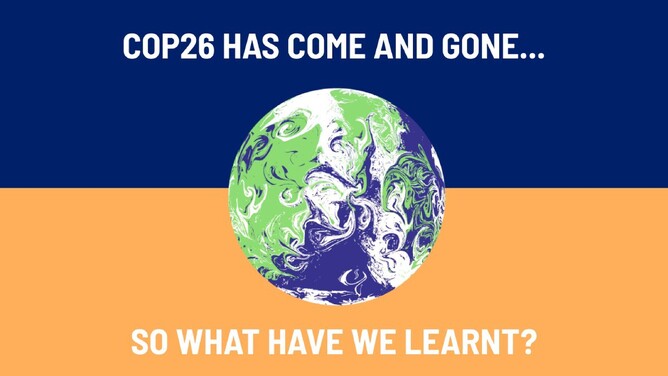COP26 has come and gone. The circus has packed up and left town, leaders and activists from Boris Johnson to Greta Thunberg have shared their words. In its wake, over 140 countries have committed to net zero goals, covering 90% of global emissions. But will our governments stand by their word and will these policies ever see action?
Oxtera Consulting ran a survey within their COP26 panel asking attendees and virtual attendees to vote on what they considered to be the biggest barrier to reaching a net zero life. The survey showed that policy-related barriers such as ‘slow regulatory and policy coordination’ were the biggest perceived barriers to the transition with 62% of the votes. This was followed by ‘insufficient adoption of solutions by businesses and consumers’ (26%), showing that after policy-making, the second biggest barrier is actually taking action, or perhaps the willingness to adapt to a net zero society by consumers, institutions and businesses alike.
So the problem of ‘policy to action’ appears to be two-fold. Firstly, how can policy makers coordinate to clear up regulatory uncertainty and help the needs of individuals and the climate? Secondly, how can we be sure that decisive, climate positive action will follow?
In terms of policy and decision making, humanity must learn from its past mistakes. An immense number of panels called out poor historical policy making that led to ineffective climate action. Previous climate policies were not necessarily inclusive to people on the ground and many environmental policies didn’t have supporting infrastructure. This can be seen, for example, in Germany which closed 8 of its nuclear powerplants following the Fukushima disaster to prevent similar environmental catastrophes. However, the infrastructure to support this policy was not in place so in order to meet the demand for electricity, Germany had to increase the production of brown coal which is far more pollutive than normal coal (Laitos and Okulski 2017). Good intentions, bad execution.
Some businesses have been ahead of the game in instigating real world action and have been implementing their strategies long before COP26 took place. Partnerships and collaborations with institutions, businesses and people on the ground is vital in creating positive inclusive change. Steve Murrells, CEO of The Co-operative Group, echoed these words on the Fair Trade panel – Putting Farmers First For Fair Resilience in Cocoa – a debate with industry, farmers and activists. In a powerful symbolisation for the need for collaboration, Murrells appeared alongside expert advisor Dr. Emmanuel Opoku of the Ghana Cocoa Board and Bismark Kpabity from the Ghanaian cocoa Co-op producers’ union, Kuapa Kokoo.
Murrells echoed this sentiment of collaboration on the panel, “As a retailer, my job is to take the hard effort of [farmers] and Fair Trade, listen to the influence of [industry leaders] to put the product on the shelf, and to ensure that in doing that, my organisation pays a fair price for that product”. Fair Trade have consistently fought for the rights, support and fair pay of farmers through collaborative efforts with partners such as Co-op, as well as taking on the advice of experts and Ghanaian farmers in the cocoa production industry. Over 1.8 million farmers and workers co-own Fair Trade which gives them 50% of the vote at general assemblies and most importantly, a seat at the table.
Will institutional change alone get us to net zero? Unfortunately, Institutional change needs to happen alongside individual change to make a real impact. Speaking on the ‘Changing Consumer Behaviour’ panel at COP26, Jonathan Hall, the managing partner of Kantar Sustainable Transformation Practice, spoke on the power of choices consumers have to make. Hall emphasised that consumers generally feel that the choice is not on them and the choice should be on governments and businesses to fix these problems, whilst addressing that there are consumer concerns of the quality and accessibility of ‘better’ products. If the better product has a premium associated with being better for the environment, this takes the choice away from some consumers. We need to change our purchasing habits and demand for big business to hold up their end of the bargain. By 2030, the most environmentally conscious group will represent 62% of the U.K.’s population (Kantar 2021). We can only hope that retailers step up to the sustainability plate and reflect this ethos.
Another sector which upholding the sustainability mantle is agriculture. There was much recognition for the power of sustainable agriculture practices such as regenerative agriculture at COP26. The Connect The Dots program in Sau Paulo combines regenerative agriculture with a circular business model. It connects local farmers who practice regenerative agriculture to restaurants, businesses and open ground fairs in the city. Any waste left is collected by the municipal authority and is returned to farmers as compost for free. Francisco Jose Moura De Castro, Special Advisor for Sustainability for the City of Sau Paulo, emphasized the importance of education in this program, which also includes an agroecology school that promotes sustainable practices and environmental regeneration. This initiative is an excellent example of combining circular economy logic with regenerative farming, job incentives and education.
Scale for circular innovations like this remains a barrier, alongside gaining funding and publicity. Many retailers have the funding, publicity and capacity to participate in or create programs like Connect The Dots on a large scale, particularly because in the EU and UK, 40% of the agricultural land is influenced by the top 10 retailers and food producers. Whilst some retailers have or facilitate programs like Connect The Dots, some isn’t enough.
Sector wide collaboration has been demonstrated in the insurance industry. The sector transitioning away from the fossil fuel industry and providing exit strategies for fossil fuel companies. Insure Our Future have created a 2020 scorecard for insurance companies with some positive uptake. The scorecard dictates that insurance companies will no longer insure fossil fuel expansion projects, will no longer insure fossil fuel companies and divest all assets from fossil fuel companies unless they are aligned with the 1.5 degree threshold. This type of action is vital as after pension funds, insurance companies are the largest global institutional investors with assets totalling roughly $30 trillion (Insure Our Future 2021).
Progress requires individuals to choose better and institutions to give better, sustainable and affordable choices. COP26 is now over and the time for action is upon us – let’s end the consumer-institution stalemate and have some decisive, positive climate action.
References
Changing Consumer Behaviour, COP26 Panel (2021). Available online at: https://www.youtube.com/watch?v=OAnPjGjTkXA
Climate Action Tracker 2021. Glasgow’s 2030 credibility gap: net zero’s lip service to climate action. [online] Available at:
Insure Our Future. 2021. Insure Our Future - Fossil Fuels & Insurance. [online] Available at:
Kantar.com. 2021. Winning with sustainability: attracting Eco Active consumers. [online] Available at:
Laitos J, with Okulski J (2017) Why Environmental Policies Fail Cambridge University Press.
Putting farmers first for fair resilience in cocoa - a debate with industry, farmers and activists, COP26 Panel (2021). Available online at: https://www.youtube.com/watch?v=eYFyjj_jcd0

